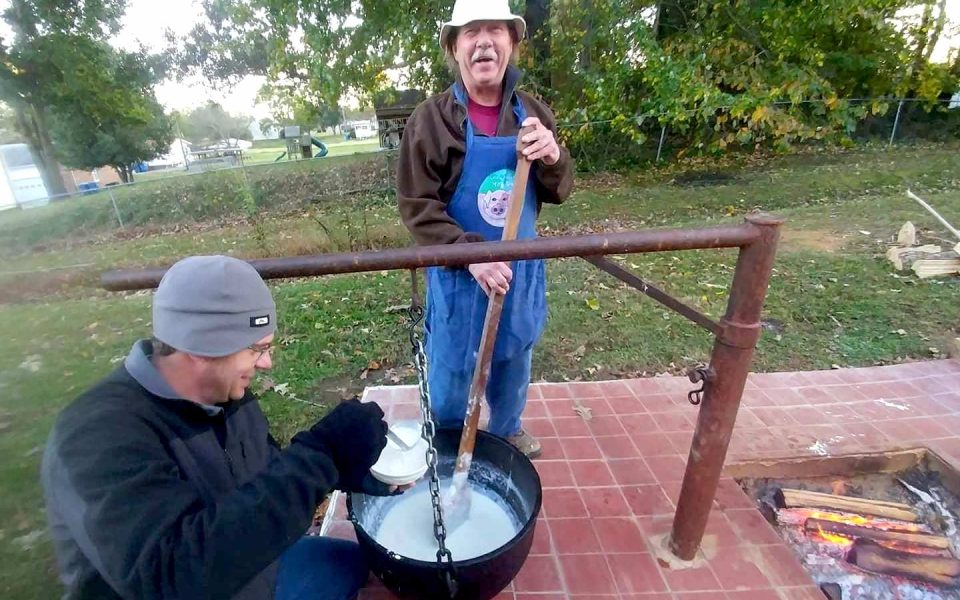There’ll be a couple dozen people, plenty of food, haybale wagon rides for the kids, s’mores and games,” the man said. “BYOB, yourself, a camp chair, your kids and your boyfriend or your husband but don’t bring both.”
“What’s a chicken stew?” I asked.
Initially I was told it was chicken breasts boiled in milk with butter, salt and pepper. It sounds disgusting, I scoffed. Against my better judgment, I was intensely curious as to why anyone would enjoy sitting outside in the cold eating milky chicken with strangers.
I accepted the invitation, not knowing what was in store for the evening. But I had just scored my first formal invite to a chicken stew.
Tonight, the first chords of an untuned guitar tinkle in the air as cars and trucks pull up in the gravel driveway. Children’s laughter and squeals echo throughout while the adults look on. As the sun sets, those who gathered zip up their jackets, pull their scarves a little tighter. Fresh logs of wood tossed onto the fire in the pit roll into the coal ash bits; blue smoke billows out from under a black kettle hovering above it.
The chicken stew was designed to bring people together for fellowship. Most are cooked in a large pot or kettle outside, over an open firepit. Folks sit in the yard to eat it while they enjoy the crisp, cool fall and winter air. The hot stew warms your insides while the open fire warms your extremities as the chill sets in and the temperature drops.
Think of a chicken stew like a cookout or a pig-pickin’. It’s a noun. It’s an event. It’s an experience. It’s a culinary delight. It’s a tradition.
A chicken stew is the transition from summer cookouts to winter hygge, wassailing and other end-of-year holiday events in western North Carolina and parts of upstate South Carolina and Georgia.
A chicken stew is the transition from summer cookouts to winter hygge, wassailing and other end-of-year holiday events in western North Carolina and parts of upstate South Carolina and Georgia.
“We follow my dad’s recipe,” Denise Hunt says. “It’s one that he got from a friend many years ago.”
That’s how every story of every chicken stew begins. Many years ago, someone decided to invite friends, family and neighbors to their home, church or other community gathering in order to feed people under auspices of a social gathering during fall and winter.
Hunt and her husband Marcus have hosted nearly a dozen of these events, sometimes combining it with Halloween festivities and a costume contest at their home in Winston-Salem.
Recipes for chicken stew vary, but it traditionally consists of a cream or milk-based broth mixed with the chicken broth from cooking whole chickens plus a few extra breasts, a sprinkle of black pepper and lots of butter (or margarine, for those who don’t believe in the power of animal-based fats). Accompanied by saltine crackers, hot sauce and dessert supplied by attending guests, dinner is served.

“I had attended chicken stews growing up and remembered them as being a fun outdoors event,” Hunt explains. “When my husband and I moved into a house that had a big enough yard to host a party, we thought a chicken stew would be a cost-effective way to feed lots of people.”
Marcus adds, “It’s sometimes looked at as ‘poor-people food’ that’s turned into a social event.”
A personal friend of mine, Anna Howell, is the queen of seasonal chicken stews. She and her husband Bryan attend multiple chicken stews each year. They have made the practice a part of their lives.
“My grandmother used to make a huge pot of chicken stew when I was growing up, but it wasn’t a like a party, it was just dinner feeding a lot of family member,” says Anna.
The first chicken stew she attended as an adult was at her church, Advance United Methodist.
Just like the traditions of Moravian chicken pie, Brunswick stew or even a chicken bog (similar to chicken stew but with white rice added), simple ingredients make for good eats to feed a mass of people.
Crackling for a few hours now, the wood is black and mottled with gray. The kettle is boiling, roiling, rolling with chicken stew while the crowd gathers around. A small group share a few bottles of beer, brewed at home by one of the attendees. The stew is ready. A man using a boat oar as a stirring spoon with one hand ladles the milky, buttery broth into bowls with the other. Guests doctor up their bowls with crunched up sleeves of saltine crackers and open bottles of Texas Pete hot sauce. My soul and my body warm up with the first taste.
Blessed are those who are poor with hunger for chicken stew, for they shall be satisfied with heat, food and fellowship.
Join the First Amendment Society, a membership that goes directly to funding TCB‘s newsroom.
We believe that reporting can save the world.
The TCB First Amendment Society recognizes the vital role of a free, unfettered press with a bundling of local experiences designed to build community, and unique engagements with our newsroom that will help you understand, and shape, local journalism’s critical role in uplifting the people in our cities.
All revenue goes directly into the newsroom as reporters’ salaries and freelance commissions.


Leave a Reply